Family / Youths

spaceEU Toolkit Launch
spaceEU is an EU project for space outreach and education activities. In order to make these activities available to a wide audience, we collected all our expertise in a toolkit. Find out about how to use it and discover how space becomes a source for inspiration
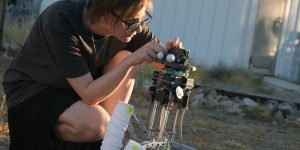
Sarah Petkus’s Noodle Feet visits the Pavilion of Knowledge
Sarah Petku’s Robot called Noodle Feet is visiting the Pavilion of Knowledge. Join and find out how the Pavilion of Knowledge looks like.
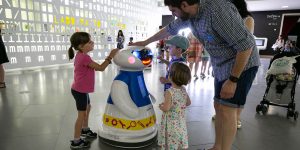
Why stars sparkle…
Rui Agostinho, co-hosted by Ana Noronha, will have a virtual live presentation, answering questions and explaining how we can deduce the chemical composition of stars from their light. Send your questions to ESERO Portugal eseroportugal-at-cienciaviva.pt with the subject line: Why stars sparkle… my questions.

Pavilion of Knowledge: A Virtual Exhibition
Visit the virtual exhibition Pavilion of Knowledge and find out what our impressive space looks like.
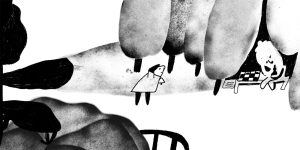
HSE Animation Garden
Varvara Fomicheva (RU), Polina Nevozhay (RU), Daria Ivanova (RU), Nastya Panina (RU), Maria Maximova (RU), Elena Charobay (RU)
HSE Animation department displays the work of young female directors: Varvara Fomicheva, Daria Ivanova, Nastya Panina, Maria Maximova, Elena Charobay. This part of the HSE Garden Pavilion flourishes in diversity: from a remake of a classic Russian fairytale in a setting of an environmental catastrophe to an intimate story about a mysterious digital garden.
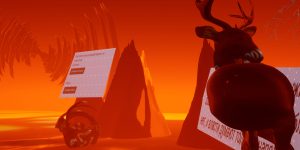
"Get Out", a 3D game
Elena Vlasova (RU)
The world of “Get out” happily greets us at its gates, promising a journey through a utopian and positive space. However, as we interact with its inhabitants, the story turns out to be different. In the world of “Get Out,” nature refuses to be vulnerable and actively defends itself with a surrealistic mix of natural objects and Internet artifacts.
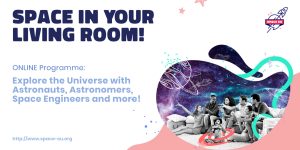
Space in your Living Room!
Space in Your Living Room! is an online program that brings astronauts, artists, space scientists and engineers, into living rooms across Europe and beyond. It is a series of fun activities, exciting challenges with amazing prizes, and live events for young people, families and educators. At Ars Electronica Festival we will share conversations between astronauts and artists, and the youth art projects created during the program: including stories, speculative design and young reporters stories.
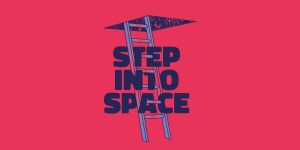
Step into Space
Online Exhibition
Step into Space is an exciting exhibition developed by Ars Electronica, Science Gallery Dublin and University Leiden that brings together space sciences and art to inspire youths and their families. Space mission will lead you through the story.

What We Eat
Laurie Frick (US)
As part of Heartbeat of the Earth, a series of online interactive artworks interpreting climate data, data artist Laurie Frick’s work examines the impact of individual foods on the environment using hand-drawn data visualisations, color coded and sized by CO2 output.
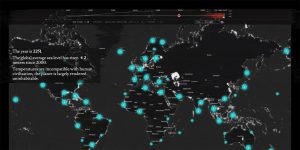
Coastline Paradox
Timo Aho (FI) & Pekka Niittyvirta (FI)
As part of Heartbeat of the Earth a series of online interactive artworks interpreting climate data, using Google Maps and Street View, artists Pekka Niittyvirta and Timo Aho visualize the predicted sea level rise – and the number of people likely to be displaced – in more than 200 different locations between the years 2000 and 2300.
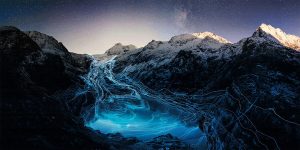
Timelines
Fabian Oefner (CH)
As part of Heartbeat of the Earth, a series of online interactive artworks interpreting climate data, artist Fabian Oefner explores the retreat of the Rhone and Trift glaciers in Switzerland over the last 140 years by using precise digital coordinates and special drone captures.
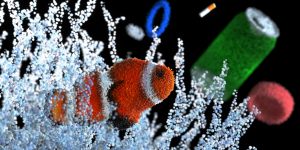
Diving into an Acidifying Ocean
Cristina Tarquini (IT/FR)
As part of Heartbeat of the Earth, a series of online interactive artworks interpreting climate data, digital artist Cristina Tarquini invites us to dive into our acidifying oceans using data from NOAA. Cristina Tarquini (IT) created an interactive data visualisation, inviting you to dive into the ocean and explore the impact of rising temperatures & in turn rising CO2 levels on marine life, over time.
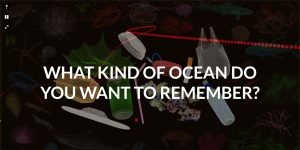
Diving into an Acidifying Ocean – Q&A
Cristina Tarquini (IT/FR), Frédéric Gazeau (FR) & Freya Murray (UK)
Join the Q&A with the artist who created the online experiment and the scientist who advised her.
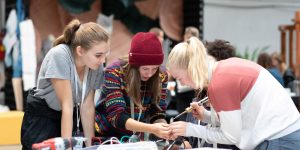
create your world 2020
Kepler's Garden am Campus der JKU
Das Festival create your world lädt junge Menschen und Junggebliebene ein, soziale und kreative Nähe zu schaffen – mit physischer Distanz. In einem Netzwerk des Austauschs werden Projekte, Ideen und Talente geteilt. Diese Plattform für Bildung, Experimente und verschiedene Zukunftsszenarien wird eine große Vielfalt junger Expert*innen präsentieren, die alle voneinander lernen können.
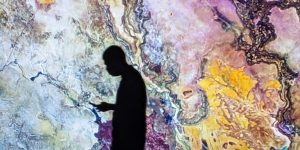
Supraspectives
Quadrature (DE)
Audiovisual installation, developed with local (citizen) science and astronomy community during an Art-and-Science Residency at the Medialab of Tabakalera, Spain.
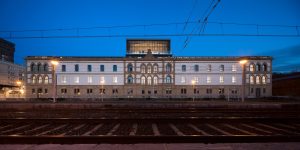
Tabakalera San Sebastian and Ars Electronica Linz
Tabakalera (ES)
Tabakalera is celebrating together with Ars Electronica its 5 years celebration. This installation will be the centerpiece of the program to celebrate the fifth anniversary, during the weekend of Sept. 11 and 12.
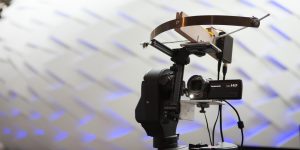
#festivalstories
Lennard Barth (AT), Celine Fahrngruber (AT), Samuel Gerersdorfer (AT), Joshua Haiden (AT), Elias Illig (AT), Sophie Kaufmann (AT), Irina Pitterle (AT) Xaver Quintus (AT)
Junge Filmemacher*innen, junge Talente, Young Professionals sind aufgefordert, Minidokumentarfilme zu drehen, die ihre Perspektiven und Eindrücke von den Themen des Festivals festhalten. Anstelle einer allgemeinen Festivaldokumentation werden acht Kurzgeschichten produziert, die verschiedene Slots und Protagonist*innen enthalten.
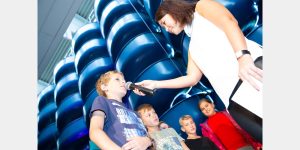
Talent Talks
Als ergänzender internationaler Teil der Kategorie u19-create your world des Prix Ars Electronica spricht Jurymitglied und Moderatorin Conny Lee (AT) mit einigen der diesjährigen GewinnerInnen über ihre Ideen, Kreativität und Zukunftsvisionen.

Jugend hackt remote: digital gardening
Jugend hackt Austria (AT), c3 (HU), mb21 (DE), ArtechLAB (NL), Ars Electronica (AT)
Wir präsentieren das Ergebnis von Jugend hackt remote: digital gardening, einem Hackathon für Jugendliche von 12 bis 18 Jahren. Er fand am 29. August statt und lud junge ProgrammiererInnen aus Österreich, Deutschland, Ungarn und den Niederlanden ein.

Young Animations
Jedes Jahr reichen junge begabte FilmemacherInnen ihre schrägen, subtilen, witzigen, utopischen, kritischen und dystopischen Arbeiten für die Kategorie "u19-create your world" des Prix Ars Electronica, für den Wettbewerb mb21(DE) und den c<19 (HU) ein. Sie zeigen uns ihre starke Vorstellungskraft, ihr tiefes Verständnis für bestimmte Themen, und das alles ausgedrückt mit ihren Fähigkeiten innerhalb eines Mediums.


